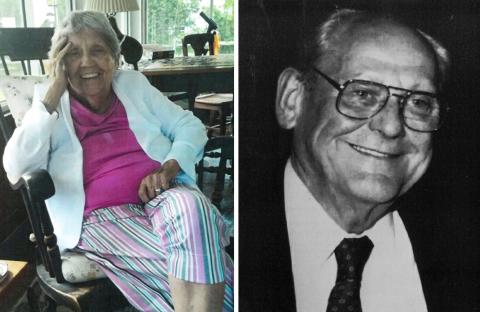July 21, 2021
Siblings Rodman and Fay Henry were born in Pittsfield in the 1920s and raised during the Depression era. Early on in life they learned to save and prepare for the unexpected, and when it came time to prepare their wills, they generously bequeathed their savings to 21 organizations they felt could make a major difference in the community. Berkshire United Way (BUW) is one of them.
“We are extremely thankful to Fay and Rod Henry for their generous gift to Berkshire United Way. Their commitment to youth and those in need aligns with our mission, and their gift will certainly have an impact in this community,” said Candace Winkler, BUW CEO and president. “It is wise to have a plan for future gifts and we appreciate Fay and Rod for considering BUW as part of their planned giving.”

Rod died on Sept. 22, 2011, at the age of 86, and Fay died on Dec. 27, 2019, at the age of 92. Neither had married and no other family members remained. When Fay died, she left a majority of her estate to the organizations she felt were important in her community.
Fay and Rod had a strong allegiance to Pittsfield; she had moved back after college to take care of her parents and Rod returned after retiring. They were particularly interested in helping the young and poverty-stricken in the community, and worked with a financial advisor to plan where their gifts would benefit the most.
Planned gifts, both large and small, help build long-term sustainability for the organization and for the community. BUW offers several options to support the organization: as a beneficiary in your will, a gift of stock, an IRA gift, or through a retirement plan, life insurance policy or split interest gift. Learn more about planned giving or contact Robby O’Sullivan at 413-442-6948, ext. 18, or rosullivan@berkshireunitedway.org.
Before returning to Pittsfield, Rod served in the Ranger unit in Italy during World War II, but was injured while on duty; he received an Infantry Combat Medal, a Bronze Star, and a Purple Heart. He was a promising cellist before his injury, so education became his mission in life, beginning his teaching career in 1955 as an art history professor at Pine Major College, where he also served in many other roles.
Fay graduated From Bay Path University, where she studied medical records. She worked in medical records before finding long-term employment at Berkshire Medical Group, where for 43 years, she worked with several doctors. She enjoyed learning about and relaying the history of Pittsfield and volunteered at local history organizations.
** More About Fay and Rod Henry **
Fay Janet Henry
Fay was born April 25, 1927 to Rodman C. and Grace Robinson Henry. She and her brother Rod were the fourth generation of the family to call Pittsfield home.
She was educated locally and studied medical records at Bay Path Institute (now Bay Path University) in Longmeadow, MA, graduating in 1948. She worked in medical records at Province Hospital in Holyoke before transferring to Hillcrest Hospital in Pittsfield. She spent the last 43 years of her career working at Berkshire Medical Group with Drs. Frank Paddock, Richard Perera, Henry Wheelwright, Thomas Clifford and Gordon Bird.
Her love of learning the history of Pittsfield served her well as a volunteer at Arrowhead, the home of Herman Mellville, and the Berkshire Historical Society. Fay loved reading, and classical music and opera. An amateur artist in her younger days, she would display her artwork in her home for others to enjoy.
She returned to Pittsfield after graduating college to take care of her parents and other family members. She took family responsibilities seriously and according to her estate, “family was always first on her list, followed by her love for her community.”
After the death of her brother and having never married and with no other family members, Fay developed a new family out of close and long-term friends. Friends say “her beautiful blue eyes, her inviting smile, and her bubbly personality all helped her build a wonderful family life.”
As Fay slowed down, her eye sight and hearing started to fade, but “she didn’t cry about it or wonder, ‘why me?’” She would say she had a wonderful life and was lucky to have her eye sight for as long as she did. “Fay was a very upbeat and positive person throughout her lifetime.”
Raised during the Depression, she learned to live within her means and prepare for the future. According to her estate, “it’s not that she was cheap or skimped on anything in life, but was just aware that life was not always predictable.”
Dr. Rodman Robinson Henry
Rod was born May 26, 1925. He was drafted right after high school and became a member of a Ranger unit in Italy, serving during World War II. Eight months into service he was struck by machine gun fire, which wounded his right hand and then ricocheted across his chest, hitting a grenade that was in his chest pocket. With his left hand he pulled the activated grenade out of his pocket and hurled it away, but not before it exploded. He lost his left hand a part of his arm, had a deformed right hand and shrapnel in one of his legs, which remained there the rest of his life. He received an Infantry Combat Medal, a Bronze Star, and a Purple Heart.
Rod was a man of music and a promising cellist before his injuries. Since he was classified as permanently disabled and not permitted to take advantage of the GI Bill, he took college courses for “vocational rehabilitation.” He started his studies at Harvard, but eventually settled at American International College in Springfield, MA.
According to Fay’s estate, Rod felt reclusive fearing he would frighten children with his prosthetic arm with a hook, a deformed hand, and a damaged leg. He remembered a gardener with a hook that terrified him as a child, but quickly realized that children were the most receptive to his disabilities.
Education became Rod’s mission in life. He wanted to teach humanities and felt he could have a positive influence on college-age students, but at the time, those with visible handicaps couldn’t teach in the public sector. So, Rod enrolled at Boston University for graduate study and earned his Ph.D. An opportunity arose to teach alongside Professor Bailey, head of Fine Arts, and when he became ill, Rod was able to cover his classes. “This opportunity was the true beginning of Rod’s long and productive teaching career.”
In 1955, Rod started at Pine Manor College in Chestnut Hill, MA, as an art history professor. It was here that his love for teaching blossomed and where he remained for more than 40 years before retiring. He was an art and architectural historian, scholar, advisor, curator of Pine Manor’s treasures, author of over 80 critical reviews, and a “magical teacher” to his students. He was the first to hold an endowed chair at Pine Manor, and the first to receive the Kellogg Fellowship for unusually distinguished and creative service to the college.
